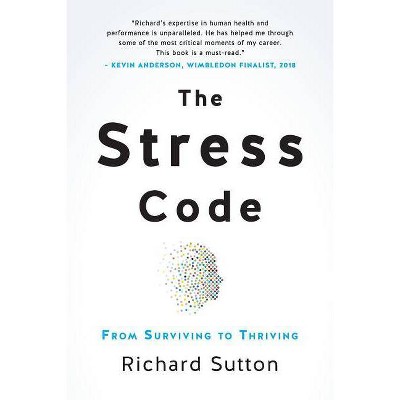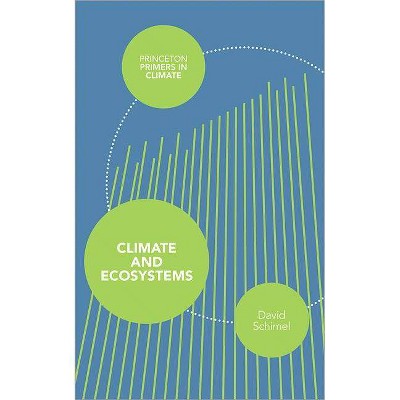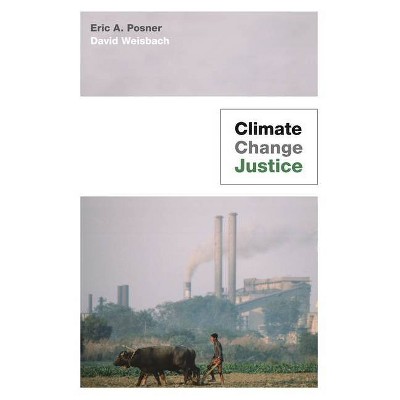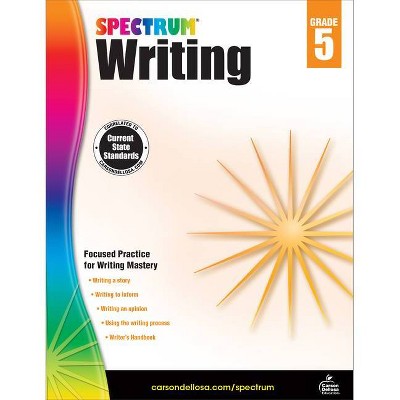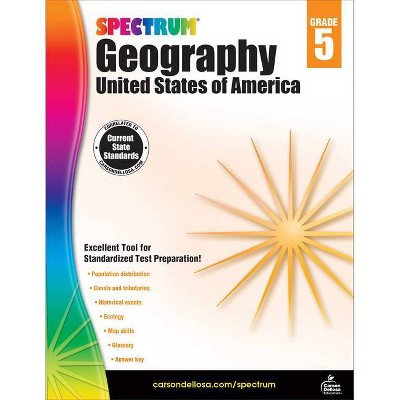Climate Code Red - by David Spratt & Philip Sutton (Paperback)
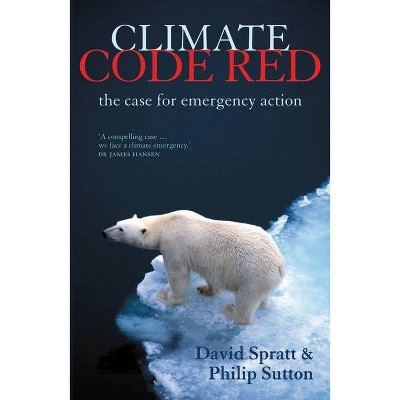
Similar Products
Products of same category from the store
AllProduct info
<p/><br></br><p><b> Book Synopsis </b></p></br></br><p>This meticulously documented call-to-action reveals extensive scientific evidence that the global warming crisis is far worse than officially indicated -- and that we're almost at the point of no return. </p><p>Serious climate-change impacts are already happening: large ice-sheets are disintegrating, sea-level rises will reach 5 metres this century, and we are seeing devastating species loss. </p><p>It is no longer a case of how much more we can 'safely' emit, but whether we can stop emissions and produce a deliberate cooling before the Earth's climate system reaches a point beyond any hope of human restoration. </p><p>These imperatives are incompatible with 'politics as usual' and 'business as usual' -- we face a sustainability emergency that urgently requires a clear break from the politics of failure-inducing compromise. </p><p/><br></br><p><b> Review Quotes </b></p></br></br><br><p>"This is a great book that deserves a broad readership. If the earth is saved, these straight-talking authors will deserve a lot of the credit." <br />--<b>Brendan O'Reilly, <i>Big Issue</i></b></p> <p>"This book is essential reading for everyone." <br />--<b>Catherine Money, <i>Park Watch</i></b></p> <p>"Spratt and Sutton make an unimpeachable case that "a sustainability emergency is not a radical idea. It has become necessary to save our future."" <b>STARRED REVIEW</b> <br />--<b><i>Publisher's Weekly</i></b></p> <p>"Meticulously documented...a compelling, topical read." <br />--<b><i>SA Life</i></b></p> <p>"Perhaps the two most outstanding books on global warming to have been published lately are <i>The Hot Topic</i>...and <i>Climate Code Red</i>. Were I a philanthropist, I would purchase several hundred copies of both and send them to our politicians and policy-makers." <br />--<b>Robert Manne, <i>The Monthly</i></b></p> <p>"Excellent...a concise and compelling assessment of how the science of climate change is being radically revised to account for the possibility, now approaching a likelihood, of a number of threshold events, any number of which would be catastrophic." <br />--<b>Clive Hamilton, <i>The Monthly</i></b></p> <p>"The stark fact is that we face a global sustainability emergency. But it is impossible to design realistic solutions unless we first understand and accept the size of the problem. <i>Climate Code Red</i> is a sober, balanced analysis of this challenge, unadorned by political spin, proposing a realistic framework to tackle the emergency." <br />--<b>Ian Dunlop, former international oil, gas, and coal industry executive</b></p> <p>"This is a frightening but clear-eyed, well-informed, and sober consideration of the weight of evidence and argument on the imminent and quite possibly cataclysmic impacts of climate change. It is a wake-up call and antidote to the sanitised reporting on the state of the planet and global warming. As a social and environmental psychologist reader, this critical overview is impressive, comprehensive, and convincing." <br />--<b>Dr Joseph Retter</b></p> <p>"Recent greenhouse gas emissions place the Earth perilously close to dramatic climate change that could run out of our control, with great dangers for humans and other creatures. There is already enough carbon in the Earth's atmosphere for massive ice sheets such as West Antarctica to eventually melt away, and ensure that sea levels will rise metres in coming decades. Climate zones such as the tropics and temperate regions will continue to shift, and the oceans will become more acidic, endangering much marine life. We must begin to move rapidly to the post-fossil fuel clean energy system. Moreover, we must remove some carbon that has collected in the atmosphere since the Industrial Revolution. This is the story that <i>Climate Code Red</i> tells with conviction. It is a compelling case for recognising, as the UN secretary-general has said, that we face a climate emergency." <br />--<b>Dr James Hansen, director of the National Aeronautics and Space Administration Goddard Institute for Space Studies</b></p> <p>"<i>Climate Code Red</i> applies an uncommon degree of common-sense to the latest climate science, and is a well-researched basis for building a truly meaningful response. It makes it abundantly clear that greenhouse-gas emissions have to stop entirely, and that even this must sit in a larger plan to manage our destabilised earth-atmosphere system." <br />--<b>Tim Helweg-Larsen, Director, Public Interest Research Centre, UK</b></p> <p>"David Spratt and Philip Sutton have provided a valuable and sobering contribution to the policy challenge of climate change at a pivotal moment, with their key insight that the expectation of failure has become the norm in climate policy. <i>Climate Code Red</i> is a significant contribution which should be read by anyone seriously contemplating how to set greenhouse emission-reduction targets." <br />--<b>Senator Christine Milne, Australian Greens Party</b></p> <p>"Having been involved with global warming climate change as a researcher in environmental health for 25 years, I can say that this is without question by far the best book to date on this issue--the first book to have the integrity to say how the situation really is." <br />--<b>Dr Peter Carter, Canada</b> <p>"It is wrong-headed for society to mundanely think about addressing "climate change", because this term, and its sister phrase "global warming", both imply a sedate and gradual transition. Yet recent science, and the history of past climates, tell us that this is an absurdly optimistic expectation. The Earth's climate is a complex and interconnected system, dominated by amplifying feedbacks, thresholds, delays and non-linearities. We have already witnessed surprises--the recent dramatic loss of Arctic summer sea ice and the rapid polewards expansion of tropical weather systems causing drying of the mid-latitudes are just two of many examples--and we should expect more: large and abrupt climatic lurches are likely this century and perhaps within years. That is why Spratt and Sutton speak of the "climate emergency" and argue that there is a supremely urgent need for society to take immediate, transformational action to restore a safe climate. <i>Climate Code Red</i> is a superb, visionary blueprint for development in a new century which tackles the tough questions of how humanity can, in practice, rapidly secure a sustainable future. But it is also a work in progress, a draft strategy, which is primed to be shaped and developed by those who step up to meet the challenge we all now face." <br />--<b>Professor Barry W. Brook, Sir Hubert Wilkins Chair of Climate Change, Director of Research Institute for Climate Change and Sustainability, The University of Adelaide</b></p> <p>"The book draws on a vast array of information to build a cogent and compelling case that we do have a genuine emergency on our hands if we are to limit the rise of greenhouse gas emissions to a level at which we can limit the degradation of our planet to manageable levels...There is no doubt in my mind that this is the greatest problem confronting mankind at this time and that it has reached the level of a state of emergency." <br />--<b>Professor David de Kretser, A.C., Governor of Victoria</b></p><br><p/><br></br><p><b> About the Author </b></p></br></br><b>David Spratt</b></b> is a climate policy analyst and cofounder of Carbon Equity, which advocates personal carbon allowances as the most fair and equitable means of rapidly reducing carbon emissions. He has extensive advocacy experience in the peace movement and in developing community campaign communication and marketing strategies. <b>Philip Sutton</b> is the convener of the Greenleap Strategic Institute, a nonprofit environmental strategy think tank and advisory organization promoting the achievement of global and local ecological sustainability. He is the founder and director of strategy for Green Innovations, the architect of the Victorian Flora and Fauna Guarantee Act, and a former president of the Australian and New Zealand Society for Ecological Economics.
Price History
Price Archive shows prices from various stores, lets you see history and find the cheapest. There is no actual sale on the website. For all support, inquiry and suggestion messagescommunication@pricearchive.us
